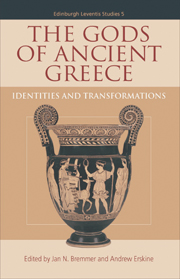Book contents
Introduction: The Greek Gods in the Twentieth Century
Published online by Cambridge University Press: 05 August 2013
Summary
When the first Indo-Europeans entered Greece in the early centuries of the second millennium BC, they arrived not without gods. So much is clear from comparisons with other Indo-European cultures. It is much harder to know whom they brought and how they called their gods. For reasons unknown, at an early stage the Greeks seem to have dropped the term *deiwós, ‘god’, attested in nearly all branches of the Indo-European family, which is a derivative of IE *dyew-/diw-, which denoted the bright sky or the light of day. Instead they opted for theós, originally ‘having the sacred’, cognates of which have been recognized in Armenian and, rather recently, in Lycian, Lydian and Hieroglyphic Luwian. The change must have happened at an early stage of Greek history, as it had already taken place in Mycenaean times, the oldest period for which we have evidence regarding the gods of ancient Greece, as the frequent attestations of Linear B te-o show.
Traditionally, the Indo-Europeans located their gods in heaven, as did the Greeks. In Homer, and thus surely going back to Mycenaean times, the gods are the ‘heavenly ones’ or those ‘who occupy the broad heaven’, whereas mortals live on the earth, but the expression ‘gods and men’ with its variants must be equally old and is formulaic in Homer.
- Type
- Chapter
- Information
- The Gods of Ancient GreeceIdentities and Transformations, pp. 1 - 18Publisher: Edinburgh University PressPrint publication year: 2010



